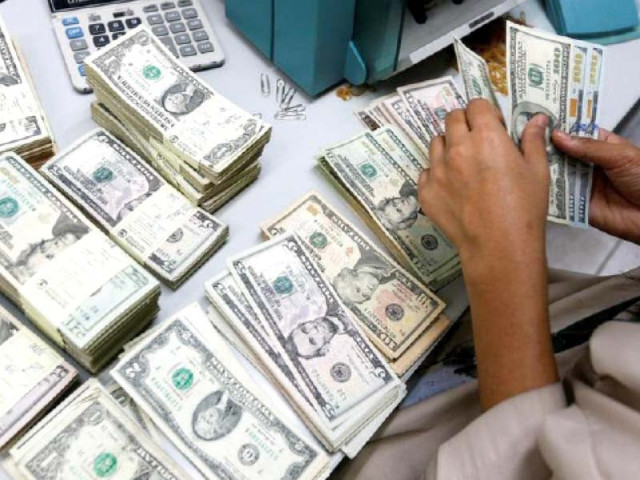ADB to lend $300m to Pakistan
Loan will take pressure off country’s foreign exchange reserves

The Asian Development Bank (ADB) will lend $300 million to support Pakistan’s fragile foreign exchange reserves after Islamabad met almost all the conditions related mainly to lowering barriers to imports.
The board of directors of the Manila-based lending agency is likely to approve the $300 million worth of second tranche of the Trade and Competitiveness Programme in the last week of current month, sources in the lending agency told The Express Tribune.
The $300 million is part of the $800 million budgetary support programme and the regional lender has already disbursed the first tranche in August last year.
The ADB has so far extended over $600 million in loans to Pakistan in the current fiscal year and after the upcoming approval, its lending will jump close to $1 billion. However, about 60% of lending is in the shape of policy loans, which are not helpful in the long run.
Both the money and timing of approval are crucial for Pakistan when the $6-billion International Monetary Fund (IMF) bailout package has been technically suspended since February this year. The approval of the policy loan will be an indication to markets that global lenders are still engaged with Islamabad, although the government is currently sailing through choppy waters.
The loan will partially support the gross foreign exchange reserves, which currently stand at $12.1 billion, ahead of some major unplanned repayments including $2 billion to Saudi Arabia. Sources said the government had made adequate arrangements so that forex reserves could remain around current levels.
The loan of $300 million is being sought in the name of trade reforms, like the first tranche of $500 million. Despite the $500-million loan, there was no improvement in the country’s exports that remained flat, even in the pre-coronavirus situation. Pakistan is annually paying 2% in interest on the $500-million loan, taken for 25 years.
Sources said the government had met all but one of the conditions. The National Single Window (NSW) Act could not be passed by parliament and the government assured the lender that the bill would be passed by the National Assembly before the end of December, said the sources. To qualify for the loan, the government has already approved the national tariff policy and has also removed the requirement for importers to confirm that all imported machinery and capital goods are not made locally to get customs duty exemption.
Several raw materials and intermediate inputs have also been exempted from customs duty, like cotton yarn, cotton fabrics, sewing thread of manmade filaments and synthetic textile material.
The government takes credit for these measures but actually these have been implemented under the conditions imposed by the ADB.
The ADB has asked Pakistan to operationalise NSW - a company set up to perform tasks that are otherwise the responsibility of Pakistan Customs. For doing the regular job, bureaucrats will be paid additional sums. The operationalisation of Export-Import Bank of Pakistan is also part of the ADB conditions and for this purpose the cabinet has recently approved a presidential ordinance.
There has also been greater focus on reconstitution of the Pakistan National Accreditation board of directors to include professionals with sector expertise and scientific knowledge.
The ADB is of the view that Pakistan’s exports have remained stagnant and its share in global exports is on the decline due to biases against exports and a narrow base. Pakistan’s export performance lags behind that of South Asian and Southeast Asian peer countries, including those that entered key export industries such as textile later than Pakistan.
One of the reasons for stagnant exports was heavy taxation on the corporate sector, which the ADB said made exports uncompetitive.
During previous years, additional revenues were raised largely from existing taxpayers, without broadening the tax base, putting excessive burden on corporate and trade players, according to the ADB documents prepared for loan approval.
It said additional customs duty was imposed on machinery and intermediate goods to raise revenues, to reduce import demand and narrow the balance of payments deficit.
Average tariffs remain high and tariff structure has become more complex, including 13 duty slabs with more than 7,000 tariff lines and reversing the progress on previous simplification efforts.
To protect the budget from the impact of exchange rate fluctuations on imported goods and foreign debt servicing costs, the real effective exchange rate of Pakistani rupee was allowed to appreciate by more than 29%, which further eroded export competitiveness.
However, after letting the rupee shed its value during first two years, the Pakistan Tehreek-e-Insaf (PTI) government is now trying to make the rupee strengthen, which is not in line with the ADB and World Bank policy prescriptions, said the sources. The dollar traded at a six-and-a-half-month low of Rs158.91 on Monday.
Published in The Express Tribune, November 10th, 2020.
Like Business on Facebook, follow @TribuneBiz on Twitter to stay informed and join in the conversation.



















COMMENTS
Comments are moderated and generally will be posted if they are on-topic and not abusive.
For more information, please see our Comments FAQ